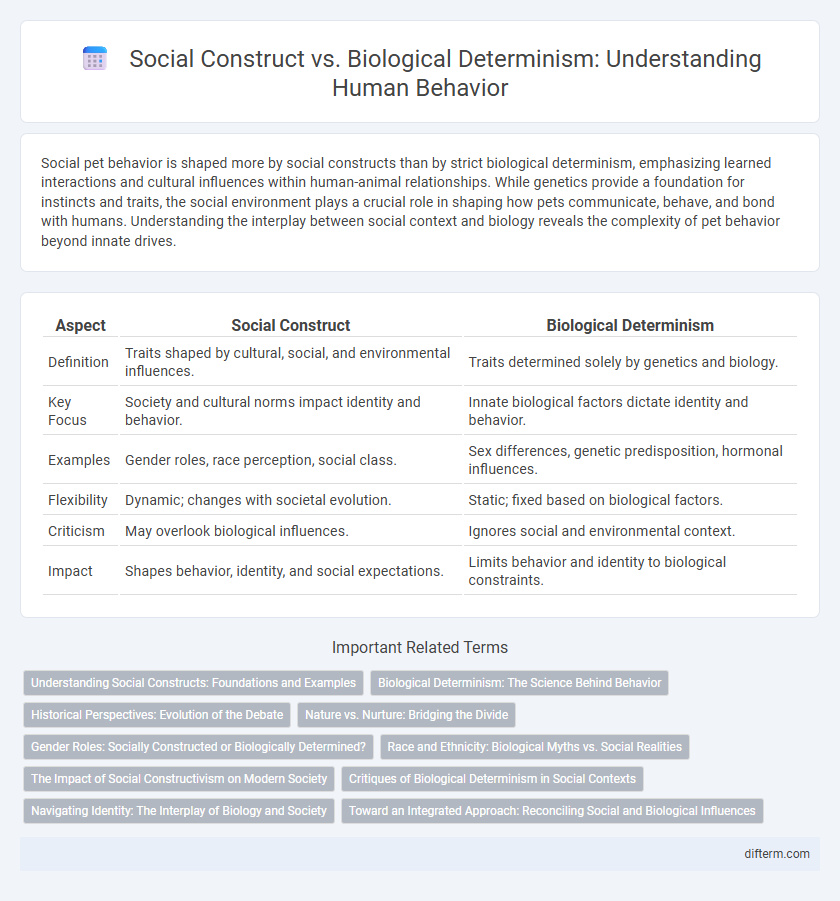Social pet behavior is shaped more by social constructs than by strict biological determinism, emphasizing learned interactions and cultural influences within human-animal relationships. While genetics provide a foundation for instincts and traits, the social environment plays a crucial role in shaping how pets communicate, behave, and bond with humans. Understanding the interplay between social context and biology reveals the complexity of pet behavior beyond innate drives.
Table of Comparison
| Aspect | Social Construct | Biological Determinism |
|---|---|---|
| Definition | Traits shaped by cultural, social, and environmental influences. | Traits determined solely by genetics and biology. |
| Key Focus | Society and cultural norms impact identity and behavior. | Innate biological factors dictate identity and behavior. |
| Examples | Gender roles, race perception, social class. | Sex differences, genetic predisposition, hormonal influences. |
| Flexibility | Dynamic; changes with societal evolution. | Static; fixed based on biological factors. |
| Criticism | May overlook biological influences. | Ignores social and environmental context. |
| Impact | Shapes behavior, identity, and social expectations. | Limits behavior and identity to biological constraints. |
Understanding Social Constructs: Foundations and Examples
Social constructs are concepts or perceptions shaped by cultural and societal norms rather than biological imperatives, influencing roles, behaviors, and identities within communities. Key examples include gender roles, race, and class distinctions, which vary significantly across different cultures and historical periods, demonstrating their fluid and constructed nature. Understanding these constructs highlights how social realities are created through collective human agreement rather than fixed natural laws.
Biological Determinism: The Science Behind Behavior
Biological determinism asserts that genetic and neurobiological factors primarily shape human behavior, emphasizing inherited traits and brain chemistry over environmental influences. Research in behavioral genetics reveals correlations between specific genes and tendencies such as aggression, intelligence, and social interaction, supporting the biological basis of behavior. Neuroimaging studies further demonstrate how brain structures and neurotransmitter activity influence decision-making processes and emotional responses, reinforcing the scientific foundation of biological determinism.
Historical Perspectives: Evolution of the Debate
The historical debate between social constructivism and biological determinism has evolved significantly since the late 19th century, with early scholars often prioritizing biological explanations for human behavior and social roles. Mid-20th-century research shifted toward recognizing the influence of cultural, social, and environmental factors, highlighting how societal norms and institutions shape human identity and experiences. Contemporary perspectives increasingly integrate interdisciplinary approaches, acknowledging the complex interaction between genetic predispositions and social constructs in shaping human development.
Nature vs. Nurture: Bridging the Divide
Nature vs. nurture remains a central debate in defining human behavior, challenging the strict boundaries between social constructs and biological determinism. Emerging research in epigenetics and neuroplasticity demonstrates how environmental factors can influence genetic expression, highlighting a dynamic interplay rather than a binary opposition. This integrated perspective fosters a more comprehensive understanding of identity formation and social behavior, emphasizing the importance of both inherited traits and experiential influences.
Gender Roles: Socially Constructed or Biologically Determined?
Gender roles are predominantly shaped by social constructs rather than biological determinism, as evidenced by the vast cultural variations in expectations and behaviors assigned to men and women. Sociological research highlights how institutions, media, and family structures reinforce gender norms that evolve across historical periods and societies. While biology influences certain physical differences, the roles and traits attributed to genders arise primarily from socialization processes and cultural narratives.
Race and Ethnicity: Biological Myths vs. Social Realities
Race and ethnicity are often misinterpreted through biological determinism, which falsely attributes fixed genetic differences to social groups. Scientific research confirms that genetic variation within racial groups exceeds that between them, debunking biological myths about race. Social constructs of race and ethnicity shape lived experiences, influencing identity, power dynamics, and systemic inequalities.
The Impact of Social Constructivism on Modern Society
Social constructivism reshapes modern society by emphasizing that identities, behaviors, and roles are formed through cultural and social interactions rather than fixed biological traits. This perspective drives progressive policies in gender equality, education, and mental health by challenging traditional norms and promoting inclusivity. Research in sociology and psychology increasingly supports social constructivism's influence on cognitive development and social cohesion, highlighting its critical role in fostering adaptive and equitable communities.
Critiques of Biological Determinism in Social Contexts
Critiques of biological determinism emphasize that human behavior and social roles cannot be solely explained by genetics or biology, highlighting the significant influence of socialization, culture, and environment on individual development. Social scientists argue that attributing complex social phenomena to biology oversimplifies human diversity and reinforces stereotypes and inequalities. Empirical studies demonstrate that social constructs such as gender, race, and class shape identity and behavior far beyond biological predispositions.
Navigating Identity: The Interplay of Biology and Society
Identity emerges from the dynamic interplay between biological factors and social constructs, where genetic predispositions interact with cultural norms to shape individual self-perception and group belonging. Social institutions and media reinforce certain traits while challenging others, revealing that identity is neither purely innate nor solely constructed but a fluid negotiation influenced by both biology and society. Understanding this complexity aids in addressing issues of gender, race, and ethnicity, highlighting how biology provides a framework that society continually redefines.
Toward an Integrated Approach: Reconciling Social and Biological Influences
Integrating social constructivism with biological determinism requires acknowledging how genetic predispositions interact dynamically with cultural, environmental, and societal factors shaping human behavior. Recent interdisciplinary research highlights epigenetics and neuroplasticity as mechanisms through which social experiences modulate biological processes, demonstrating the bidirectional influence between biology and social context. This integrated approach advances a holistic understanding of identity development, emphasizing complexity beyond dichotomous perspectives.
social construct vs biological determinism Infographic

 difterm.com
difterm.com